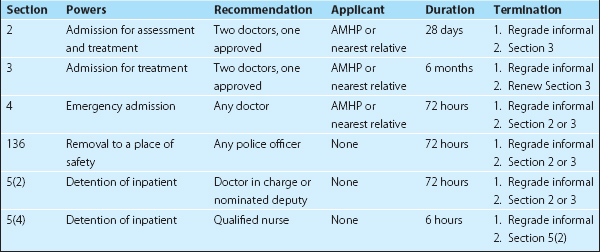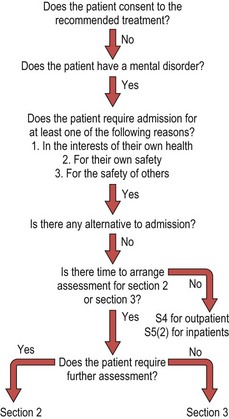The Mental Health Act
The Mental Health Act (MHA) for England and Wales allows for the admission and treatment of people with mental disorder without their consent. The MHA 1983 established these powers and was modified by a further piece of legislation, the MHA 2007. Civil sections of the MHA are discussed in this chapter and the commonly used powers are summarised in Table 1. There is a description on pages 94–95 of the powers granted by the MHA to Courts and the Ministry of Justice, allowing for the detention in hospital of people facing trial and those serving prison sentences.
Admission and treatment under the MHA
The decisions that need to be made when considering the use of the MHA are shown in Figure 1. It will be seen from this that people can only be admitted and treated against their will if they have a ‘mental disorder’, which is defined in the MHA 2007 as ‘any disorder or disability of the mind’. Detention should only be authorised if it is in the interests of the person’s health or safety, or for the protection of others, and if there is no less restrictive way available to deal safely and effectively with their problems. Detention under the MHA should not be prolonged longer than is absolutely necessary, so the detained person should be regraded to informal status by the responsible clinician (i.e. taken off section and treated on a voluntary basis) if they regain insight and agree to receive the treatment required, or if treatment is no longer needed.
All this means that, before being placed on Section 2 or 3, the patient is assessed by a doctor who knows them and by a psychiatrist and another mental health practitioner with extensive experience, and in addition their nearest relative is consulted. This process is designed to safeguard the rights of people assessed under the MHA and ensure that these compulsory powers are not used inappropriately. In light of this, either Section 2 or Section 3 should be used whenever possible if compulsory admission is required. However, it can take time to assemble the AMHP and two doctors required for these sections and, if it is not safe to wait, then there are other sections that can be used to detain the person in hospital until an assessment for Section 2 or Section 3 can take place. Section 4 and Section 136 can be used to admit people from the community and Sections 5(2) and 5(4) to detain informal inpatients who want to leave the ward; details of these powers are shown in Table 1.
Stay updated, free articles. Join our Telegram channel

Full access? Get Clinical Tree




